People living with dementia share their perspectives on seeking companionship following a diagnosis.
When Scott Drevs signed up for the dating site Zoosk in 2013, he just had a few requirements in his “looking for” section. “I was looking for a sweet woman, caring, friendly,” said Drevs. He set the age parameters to eight years younger or older than 47, his age at the time. And Drevs, who had gone through a divorce a few years prior, made it clear he was looking for an easygoing relationship. “I said, ‘if you are a person who yells at little children, dogs, or boyfriends or husbands, you’re not for me,'” said Drevs.
And with that, Drevs submitted his profile from his Green Bay, Wisconsin home. The one thing he didn’t mention: He has dementia.

Scott Drevs was 44 years old when he was diagnosed with dementia. A mechanic and former maintenance worker in the Marine Corps, Drevs was training to be an electrician when he started messing up scheduling at work. “Really what started raising red flags was that my moods started changing a lot, all over the place,” said Drevs, now 52. Within a year of first experiencing symptoms, he got his diagnosis: frontotemptoral dementia.
Within another year, his marriage of 20 years dissolved. “She basically eliminated herself from my life,” said Drevs, who has four kids with his former wife. “She couldn’t see me the same way,” he said.
Drevs dated here and there, but it wasn’t until he started dating online that he met someone he felt that spark with who could handle his dementia diagnosis. The woman he met also had a lifelong illness, and they immediately bonded.
“We both had something to tell each other,” said Drevs, of their respective diagnoses. “It just all kind of fell together.”
But even after a commitment ceremony and five years together, Drevs said his dementia can make connecting with others difficult, and he and his partner are no longer together. “Dementia is a lonely disease, even when you have a partner,” he said.
The effects of loneliness on dementia patients are well-documented: In one 2012 study on older people, greater levels of loneliness were linked to higher death rates and decreased ability to perform basic everyday functions, like feeding and bathing.
Loneliness itself imposes a significant risk. In a 2013 study of over 2,200 people, feeling lonely led to a 64 percent increase in likelihood of developing dementia. Once diagnosed, social isolation can cause a much faster decline for dementia patients, according to Lon Schneider, M.D., director of the California Alzheimer’s Disease Centers.
“It’s fairly clear that one will progress at a greater rate, especially loss of intellectual function, if the person is left alone to be a bump on a log,” said Schneider.
Social stimulation and dating apps are what Sean Ries, 43, credits with being able to live alone after a Lewy Body Dementia diagnosis—the same disease Robin Williams was diagnosed with after his death.
It was actually the letter Williams’ wife later wrote about his death that clued Ries into his condition. For about a year and a half, Ries, who owned an electronics company and was the type of person who could take apart cars and audio equipment and put them back together again without instructions, had been experiencing issues with his memory and cognitive function—problems he classifies, like a true electronics guru might, as “systemic failures.” “The best way I can explain it is like if you’re a computer and running a lot of programs and it’s all really slow,” he said.
“It’s unlike the traditional old person dementia,” said Ries. “This is more encompassing.”
But his diagnosis has given him clarity about how to spend the rest of his life. Typically, a person with Lewy body has another five to eight years after diagnosis, though life span can range from two to 20 more years. This has dramatically changed how Ries spends his time—and more importantly, who he spends his time with.
“I’ve been able to reexamine what I’m doing here,” said Ries. “And as far as the kind of people you want to associate with and what you want to do with the rest of your time, you have a lot more leeway.”
Like Drevs, Ries was in a serious relationship at the time of his diagnosis that later dissolved. While divorce rates for early-onset patients are unknown, it’s not uncommon for early-onset dementia patients and their caregivers to experience more difficulty adjusting to a diagnosis, according to a 2007 report from Alzheimer’s Austrialia. “The younger person’s more active and busy household is severely disrupted and the emotional, financial and social impact on the family may be far greater than for that of an older person,” wrote the report authors. Another 2007 study found that even when early-onset patients had the same symptoms and behaviors as typical-onset patients, their caregivers perceived that their situation was more difficult. Even outside of close relationships, it can be difficult for dementia patients to maintain the friendships they once had. A 2013 report found that one-third of dementia patients lost friends after their diagnosis.
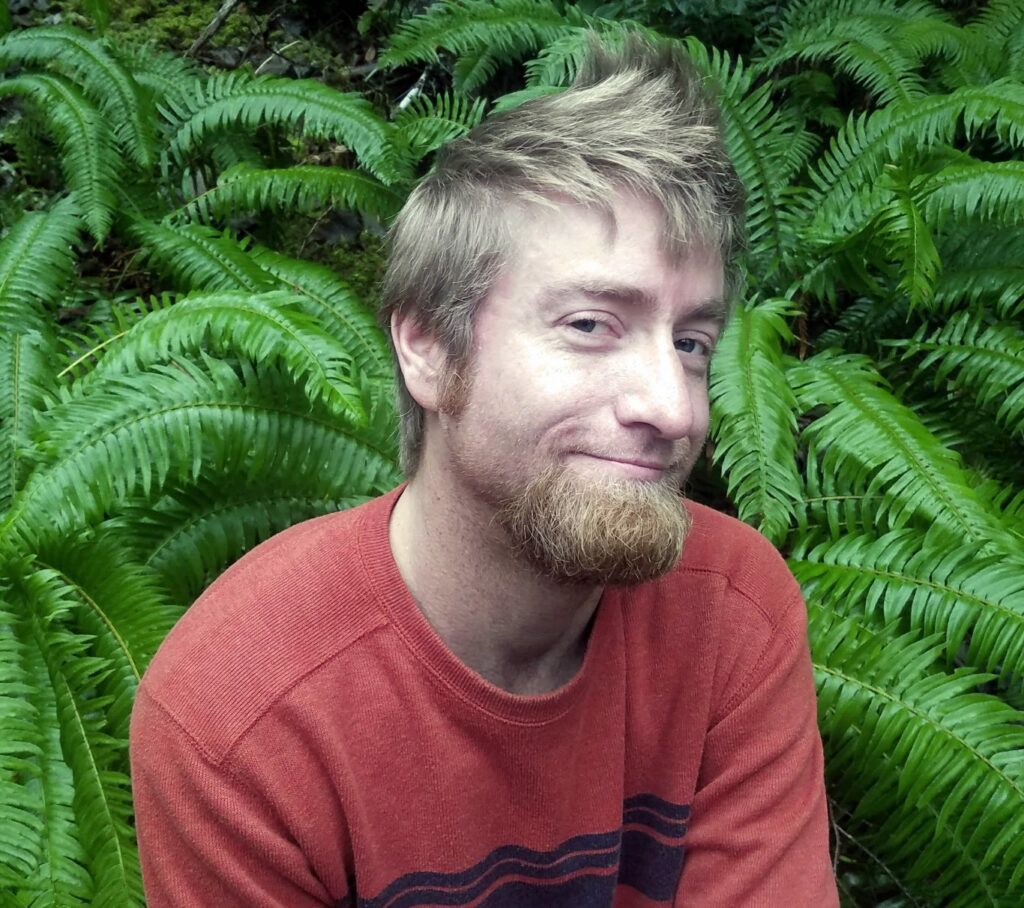
After the end of Ries’ 10-year marriage, he’s chosen to live alone, even though he technically qualified for a memory care facility. Ries was determined not to take the spot he was offered at the San Juan Rehabilitation and Care Center in Anacortes, Washington. “I’m 43. I’m not going to go live my life with a bunch of old people so I can die,” he said. But living alone presents its own challenges. “I forget to eat,” said Ries. “If I try to cook, I turn on the oven and forget about it. I have to have others.”
And he found those people in the most unexpected of places: Tinder. “I’ve met some freaking amazing people,” he said. “I’ve changed my whole outlook on relationships and friendships and all of that stuff.”
Ries has cultivated what he calls non-traditional relationships with people he has met on Tinder, which he said allows him to maintain independence. At first, he was just looking for friends. But now, some of the relationships that started on Tinder have turned romantic. While these friends help him manage his stress levels, which Ries said exacerbate the symptoms of Lewy Body Dementia, he’s careful to draw the line between full-time caregiver and friend.
“I draw boundaries of what I allow others to do for me,” said Ries. “My girlfriend doesn’t make sure I take my meds or ate this morning.”
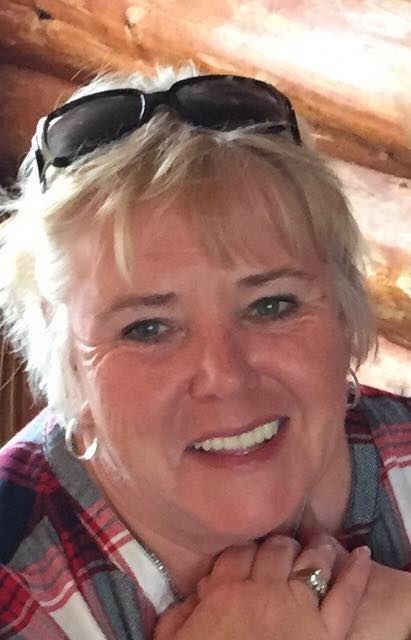
But dating with dementia, even when it’s for friendship, presents another layer of challenges when you have a terminal illness. When Christine Thelker, a former nurse who cared for dementia patients, was diagnosed with vascular dementia herself three years ago, she felt like she couldn’t tell anyone—especially not in the profile she had up on a couple of dating sites.
“I was basically told that they don’t have anything for me and get my affairs in order and go enjoy life while the window of opportunity was still there to do that,” said Thelker, who is now 59. “It’s what most people hear and what most people are told. No one tells us how to live well with our dementia,” she said.
Thelker, a widow, was just looking for someone to get coffee with, or maybe go on a day trip. But friends told her that it wasn’t safe for her to use dating sites because people might take advantage of her.
“Many people have said to me, ‘You have dementia, your judgment isn’t always perfect. You could get yourself into a bad situation trying to date,'” said Thelker.
So she took herself off the dating sites. But over time, she’s wondered if she should get back on. She has hesitations because it would be a lot to handle if something went wrong, considering the reality of her diagnosis.
“Living with dementia, we face a lot of losses,” said Thelker. “If we meet someone, go on a few dates and have to tell someone about our illness and they walk away, it’s another loss. It’s another let down. It’s a another ‘the disease wins, you lose’ feeling,” she said.
Some of the elderly patients I see, you might almost say they’re ready for it. But no one is ready to hear the word ‘dementia’ in their 40s.
Drevs, Ries and Thelker were diagnosed with forms of early-onset dementia, which is considered to be any diagnosis before the age of 65. Getting a diagnosis in your 40s or 50s is especially devastating, said Liana G. Apostolova, M.D., a professor in Alzheimer’s research at Indiana University. “Some of the elderly patients I see, you might almost say they’re ready for it,” said Apostolova. “But no one is ready to hear the word ‘dementia’ in their 40s.”
And while it might seem far-fetched for someone with cognitive and memory problems to be able to set up an online profile, Apostolova said that early-onset patients are more atypical than what most people associate with Alzheimer’s or other types of dementia. While early-onset patients usually progress much faster, they also are able to function with the disease for longer in comparison to typical-onset patients with similar levels of brain atrophy.
“Being this young provides them with some cognitive reserve,” said Apostolova. “The brain is more plastic.”
And we’re still learning a lot about early-onset dementia and forms of disease like Lewy body and frontotemporal dementia. “No one has robustly studied this version of Alzheimer’s. It’s very individual. I see patients that plummet fast and others that hold onto their faculties much longer,” she said.
While Apostolova recommends turning to Alzheimer’s support groups, Ries said he hasn’t found any personally helpful. He felt the major resources focused more on solutions for caregivers than patients.
“The isolation of this disease is pretty hard,” Ries said. “There are a lot of aspects that others tend not to relate to.”
When Ries checked LBDA.org, the largest organization for Lewy Body Disease, he found that the only support group in his area was for women only. He couldn’t find services that provide the companionship that dementia patients need—that’s why patients are turning to online dating sites and apps in the first place.
Thelker has found solace in Dementia Alliance International, a non-profit run by people with dementia that relies on technology to connect members from all over the world. The group aims to change how dementia is perceived. “There is a new face to dementia,” said Thelker. “We’re young, vibrant, we still have a lot to contribute,” she said. “If the stigma changed, it would make it much more feasible for us to get in a relationship.”
For now, technology that connects people is filling a void when dementia patients need it most.
“Sometimes it feels like a bit of a stretch or a dream,” said Thelker, of finding companionship. “But I keep hoping. I know so many people who are alone who are living with the illness that want to meet someone.”

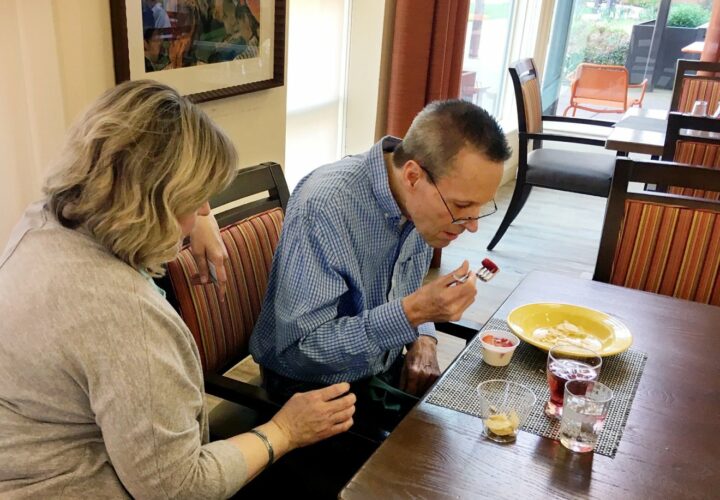
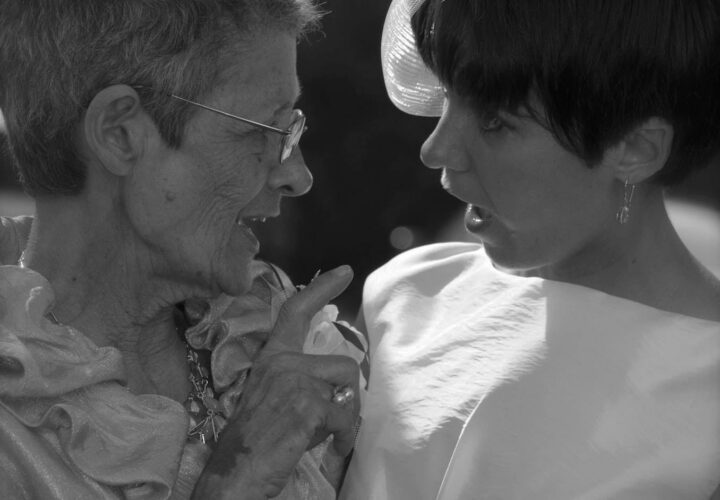
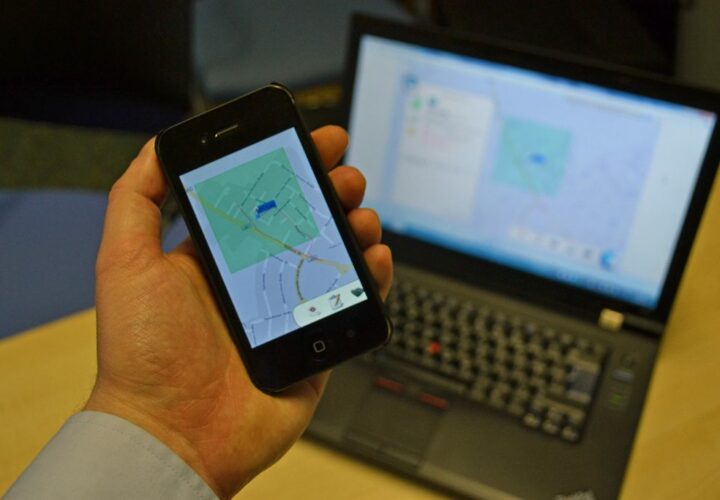
It’s not really fair living with dementia when you are still just 40 years old and would like to have a relationship with a woman but it seems like the possibility of a relationship with a woman is obviously out of the question when you have dementia so I guess I will live the rest of my life alone
No I don’t see why you should do that I’ve been with my boy friend for just over a year and he has this I love him so much and will never leave he found me while having this so it is possible don’t give up hope I never will xx
Thanks for sharing your lovely story. My partner is 48 years old & living with Dementia. I love him so much even he doesn’t remember my name most of the days.
Still I am enjoying to live with him, can laugh, eat, go out & make love.
I hope you guys could fine someone for more love & support. It is not fair to be alone because of Dementia.
I lost my husband after 44yrs of marriage 3ys in September he was my soulmate and we married when i was seventeen, I’ve been grieving since, then I’d been diagnosed with Altzimers decease and was told I’d had it for a few years before my husband died, i was his carer and not knowing i had this awful decease, I’m so very lonely now without him, but i did meet someone whom I’d felt so much love and I’ve just told him of my Alzimers diagnosis I’m so afraid he’ll walk away I’m feeling so tearful and worry about my children and grandchildren how will they cope to as i get worse.
I am a 68-year-old male in good physical condition and I’m told quite good looking but obviously I’m prejudiced. I have had dementia for a year and a half and for several months I have been free of all symptoms and I’m in very good shape and workout every morning. I have been symptom-free for several months. I have been divorced for a while and I’ve not seen what date in a woman for quite some time meaning a year and a half. I would welcome any advice on how to search for Amit someone I can date and get to know. If you have any suggestions please let me know. I don’t buy can be of any help for support systems for dementia please let me know and direct me to the contacts that would recommend what I can do.
I live in Southwest Florida in Port Charlotte
I am awaiting a diagnosis for cognitive decline and memory problems, I am 44 years old and have received an appointment for an MRI scan. I am afraid and I have just gone through a marital separation and have experienced some alienation from m older children so loneliness is already fron t and centre for me. I am sad. I have been thinking about what one of the contributions to the above article said about being alone. It is certainly isolating. However, I can do what I like with my time and I think that reframing might help a bit, but I suppose I won’t really know until after I receive the diagnosis.
It feels like there’s an empty space in my brain and it’s getting larger. I don’t seem to remember my dreams with the same clarity any more either. I just don’t know how to react. I have no next of kin. There is so much to sort out and I genuinely can’t think. I don’t really know what to do.
Hi thanks I am fit and I’m l an looking to be with a partner I can be together and be able to do so and enjoy it while I can, David
I met my partner after my husband had died. He had mild dementia but we were very happy. He is 89 and I am 82 and healthy. His children said for us not be together as they are his caregivers. They feel he is too dependent on me. I accept what they said, and I know he will forget me, but I am very sad for both of us. Is this the right decision?
Hi Mary, your feelings are completely valid, and such decisions are never easy. While we can’t say what’s right or wrong, it’s important to consider everyone’s well-being, including your own emotional health. Thanks for being part of our community.